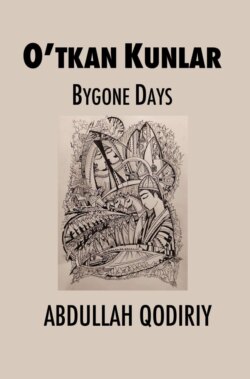Читать книгу O’TKAN KUNLAR - Абдулла Кодирий - Страница 21
На сайте Литреса книга снята с продажи.
O’tkan Kunlar
(Bygone Days)
VOLUME ONE
14
Seeking Help From Tashkent
ОглавлениеFor Kumush, who had possessed the blessings of unexpected happiness for eight whole days, this new turn of events created an unexpected disaster. As for Hasan Ali, still exultant over Bek’s marriage to his “beloved,” this calamity was no small tragedy. To add insult to injury, Oftob Oyim remained overcome; the mother who had just given away her only daughter – the very white and black of her eyes – to the groom, and had been joyous over seeing them inseparable, was now inconsolable at the fact that not only her son-in-law, but also her own husband had been thrown into the abyss. Prisoners to their heavy thoughts, they were still in disbelief over the sudden events. Kumush lamented the future of her unexpected happiness. She did not even know whether they would be reunited again. Hasan Ali, whose worries had just eased because of Otabek’s marital union, found himself vexed to yet again be in a bind. Oftob Oyim, increasingly depressed, crawled inside herself.
Kumush and Oftob Oyim shed endless tears as their only consolation against this disaster. The men’s arrest placed a full burden onto Hasan Ali’s shoulders. With no one to assist her in gaining her husband and father’s freedom, Kumush’s tearful eyes pleaded with Hasan Ali, as if saying, What should we do? Qutidor had no other male relatives to fall back on, and the only possible support on Oftob Oyim’s side of the family was Kumush’s uncle Ahmad Bek, who was known as a “devotee” and lived between Qoqan and Khujand, which made seeking his assistance impractical.
Therefore, since he was the only person faithful to Kumush and her mother, Hasan Ali took the burden on his shoulders. In your native land, where you grew up, you always have your brothers or friends. Even in the worst of times you can at least receive moral or material assistance from them. But our Hasan Ali was not in Tashkent. He was in Margilan. He was a foreigner in a city where few knew him. At first Hasan Ali had high hopes for help from Ziyo Shohichi and his son Rahmat. He knew that he had no one else to render aid. Unfortunately, those hopes were soon dashed. Ziyo-aka and Rahmat were imprisoned, and Hasan Ali himself was pursued by the authorities. Hasan Ali and Kumush’s desperation and fear multiplied. He had escaped imprisonment with Otabek and Qutidor only because he had been staying at the caravanserai. After the qorboshi’s soldiers began their search for Hasan Ali, Kumush’s and Oftob Oyim’s hope for their loved ones’ imminent release began to seem in vain. At first, Hasan Ali wanted to give himself up and share in the other prisoners’ fate and, if fate would have it, in their release. Kumush and her mother would not permit this: “Your freedom might be useful to the prisoners,” they said. Hasan Ali found their reasoning sound, but his worries doubled. He lived every minute in fear of being discovered. He hid from the qorboshi’s soldiers, changing his hiding place several times a day.
Hasan Ali lost his appetite, and he could no longer sleep at night. He asked himself constantly, Why were Otabek and Qutidor arrested? What were they accused of? Is there something I do not know about Otabek? He also considered the fact that he knew of all of Otabek’s dealings but was unsure about Qutidor – Could Otabek be taking the blame for some dirty business of Qutidor’s? This disaster reminded him of the adage “The time of your death is not decided by fate but assigned by the bloodthirstiness of your rulers, the ‘brotherhood of beks.’ ” At this moment of clarity, he could only shake his head and sigh.
For five days no one knew why Otabek and Qutidor had been imprisoned. During this period, Hasan Ali could not do anything on behalf of the prisoners in Margilan; saving his own life from the efforts of the qorboshi’s soldiers proved a big enough challenge.
Finally, he reversed his decision to remain in Margilan and instead planned to flee to Tashkent. The current state of affairs remained, but reports arrived that the Army of Qoqan were still blockading Tashkent. Hasan Ali was informed that entering the besieged city would place him in great peril. Nevertheless, he felt he had to leave for Tashkent because it was the only place that could offer him the possibility of assistance. Arriving at this decision, he consulted with Kumush Bibi and Oftob Oyim. Unfortunately, they could offer him no guidance. All they could do was weep over his plan. Hasan Ali could only try to reason with them, saying, “It seems we can find no solution here. I must go to Tashkent to seek assistance.”
Kumush countered in a faltering voice, “If you couldn’t find a solution in Margilan, how will you find one in Tashkent?”
“We have to try, my daughter. Maybe your father-in-law, or perhaps someone else, can find a solution to this mess,” said Hasan Ali.
“What will happen to us, if the oppressors…” said Kumush, unable to finish her thought. She burst out crying. Forcing back his own tears, Hasan Ali calmed Kumush Bibi.
“Do not give in to dark thoughts, my daughter,” he said, trying to console her. “Qushbegi is better than most hakims. If God wills, they will be freed from prison before I return from Tashkent.”
That very night he prepared for the road. For his trip to Tashkent they chose Qutidor’s fleetest dun Saman Yo’rg’a horse. The next morning, at the crack of dawn, the first person to depart from Margilan’s Qoqan Gates was Hasan Ali.
